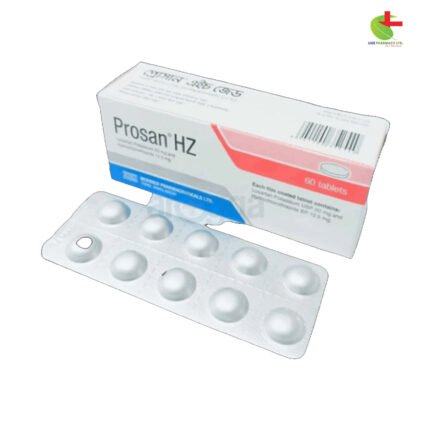Prosan 50
80.00৳ Strip
- Prosan, marketed by Live Pharmacy and branded under Square Pharmaceuticals PLC, effectively treats hypertension and delays renal disease progression in type-2 diabetic patients with proteinuria.
- It contains Losartan Potassium, an angiotensin II receptor blocker that reduces vasoconstriction and aldosterone release, key factors in managing hypertension.
- Dosage adjustments are tailored to different patient needs, ensuring effective treatment outcomes.
- Careful consideration of interactions and contraindications makes Prosan a safe choice for managing hypertension and providing renal protection.
- Stored in dry, cool conditions away from light, Prosan is a reliable medication recommended for patients requiring antihypertensive therapy.
 Brand
Brand
|
Beximco Pharmaceuticals Ltd |
|---|---|
 Generics
Generics
|
Losartan Potassium |
 Type
Type
|
Tablet |
Indications:
Prosan is prescribed for treating hypertension either alone or in combination with other antihypertensive agents. It’s also used to delay renal disease progression in hypertensive type-2 diabetics with proteinuria (urinary albumin to creatinine ratio >300 mg/g).
Pharmacology:
Losartan Potassium, the active ingredient, acts as the first non-peptide orally active angiotensin II receptor blocker. It targets AT1 receptors in tissues like vascular smooth muscle, adrenal gland, kidneys, and heart, reducing vasoconstriction and aldosterone release, thus controlling hypertension.
Dosage & Administration:
Typically, the initial and maintenance dose is 50 mg once daily for most patients. Adjustments may be made based on response, with a lower starting dose recommended for patients over 75 years or those with intravascular volume depletion.
Interaction:
Prosan interacts with medications like rifampicin, fluconazole, hydrochlorothiazide, potassium-sparing diuretics, and NSAIDs, affecting its efficacy and safety.
Contraindications:
Avoid Prosan in pregnant women, patients hypersensitive to losartan, or those using aliskiren in diabetes management.
Side Effects:
Common side effects include dizziness, diarrhea, nasal congestion, cough, and upper respiratory infections, usually mild and transient.
Pregnancy & Lactation:
Pregnancy Category D; avoid during the second and third trimesters due to potential fetal risk. Its presence in breast milk and its impact on nursing infants remain unclear.
Precautions & Warnings:
Use Prosan cautiously in patients with hepatic impairment or volume depletion. Avoid concurrent use with potassium-sparing diuretics.
Therapeutic Class:
Prosan belongs to the class of angiotensin II receptor blockers (ARBs), crucial in managing hypertension and renal protection.
Storage Conditions:
Store Prosan in a dry place away from light and heat, ensuring it’s out of reach of children.













Reviews
There are no reviews yet.